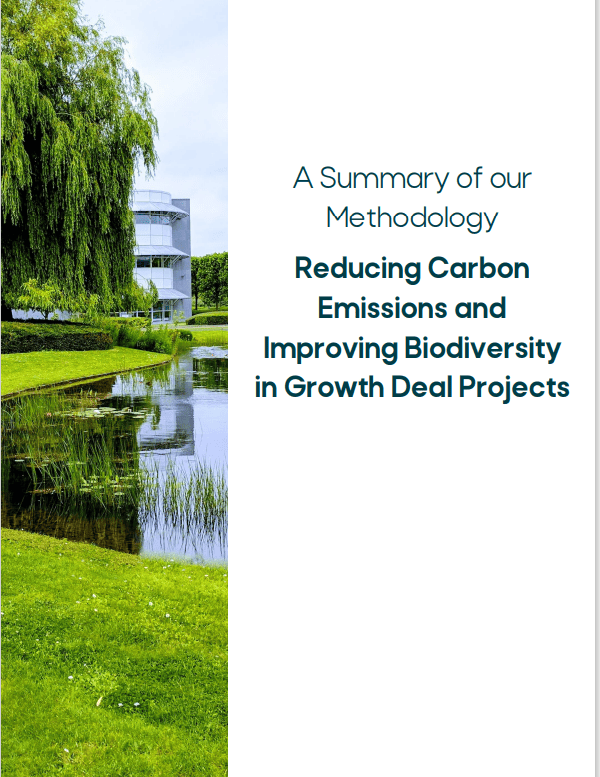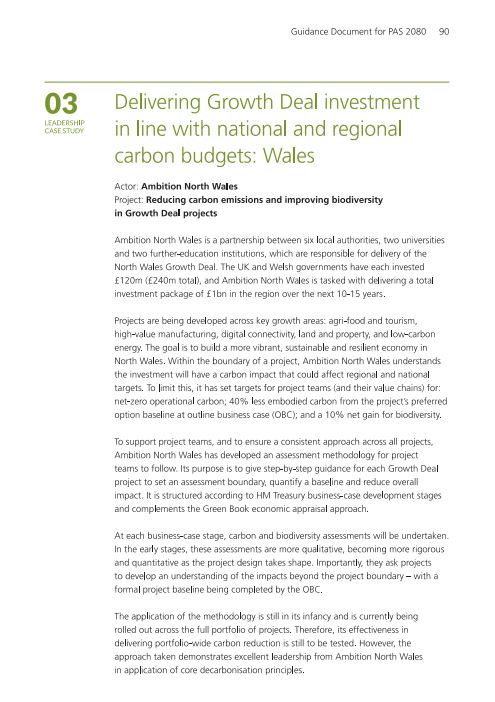Our committment
The Economic Ambition Board recognises the climate and ecological change and commit that all Growth Deal projects will address the following aims.
Our objective
We want to stimulate positive economic change for North Wales but not at the expense of damaging our environment. Our methodology will ensure that our developments are built sustainably and are ready for the future.
To achieve our committment, all Growth Deal projects will aim
0
carbon emissions when operational40%
during construction10%
increase in biodiversityRecognition
We have achieved recognition as a Leadership Case Study in the UK national carbon in infrastructure guidelines PAS 2080 – guidelines which have been hailed as a "game-changer" by the World Economic Forum.
The guidelines provide a standard for organisations in managing carbon in buildings and infrastructure, reducing carbon and cost through intelligent design, construction and use.
Robyn Lovelock, our Growth Deal Programme Manager, led the development of the approach working with Arup. She said:
“Our approach ensures that the emissions and biodiversity impacts of each project are considered from the earliest stage – when projects are simply a concept. This reduces costs by screening out potential projects that do not support sustainable development and future prosperity of our region. Equally, our approach ensures that low carbon, nature positive solutions are integrated into project design from the first step, which avoids costly re-design and retrofits later.”
For more information
If you would like access to the full methodology or would like to know more, please contact us resources@ambitionnorth.wales
Frequently asked questions
Climate Change: In summary, this means the earth is getting hotter because of the gases humans are putting into the air. The plants and animals that we need to survive, are dying because of these changes.
Carbon Emissions: Carbon Emissions (also known as CO2 emissions) are the gases created from the burning of fossil fuels (examples of where these are produced is in construction, factories and when driving cars).
Biodiversity: The number and types of living animals/ plants/ insects and so forth in an area, which are usually critical to the area's ecosystem.
We've developed a detailed methodology for our projects, which includes guidance for considering emissions and biodiversity at every stage of project development.
Within the guidance, each project must:
- Consider the energy that the project will require during operations
- Alter design changes to reduce emissions during construction
- Consider choices of construction material and their environmental impact
- Assess the state of biodiversity before and after construction
The guidance follows the steps set out in HM Treasury’s Guide to Developing the Project Business Cases and aligns with guidance by the Welsh and UK Governments.
Currently this methodology is accessible by request Adnoddau@uchelgiasgogledd.cymru
We are in a climate and ecological emergency and need to reconsider how we build things.
Currently, there is too many carbon and greenhouse gas emissions being created during construction.
Its changing our environment in dramatic ways. If organisations don't reduce the amount of emissions produced, we will see increase in sea levels and more extreme weather (flooding, storms and drought). This will also affect our food supply and medical care as less biodiversity will survive.
If we don't address these issues, quickly, we risk severe changes to weather and landscape in North Wales.
We are in a climate and ecological emergency.
We risk our lives and the future generation being significantly affected through extreme weather events and food security challenges. If we can encourage emissions reductions and biodiversity improvements through this methodology or similar to become the norm for all building projects, we can support a future-ready North Wales. We want to maximise prosperity (low carbon growth) while minimising harmful environmental impact.

